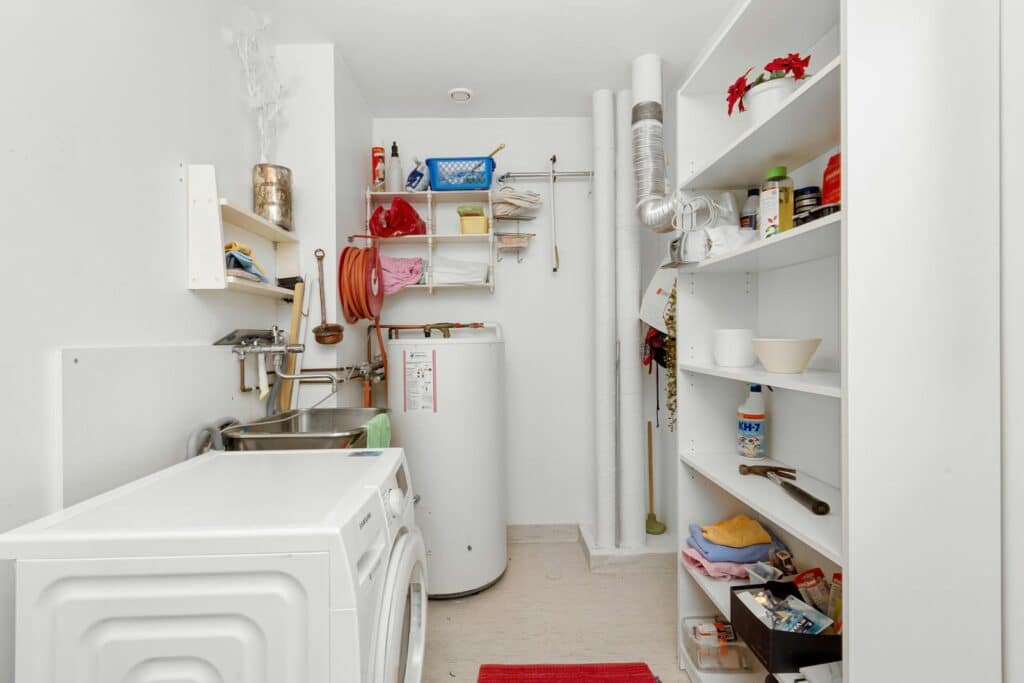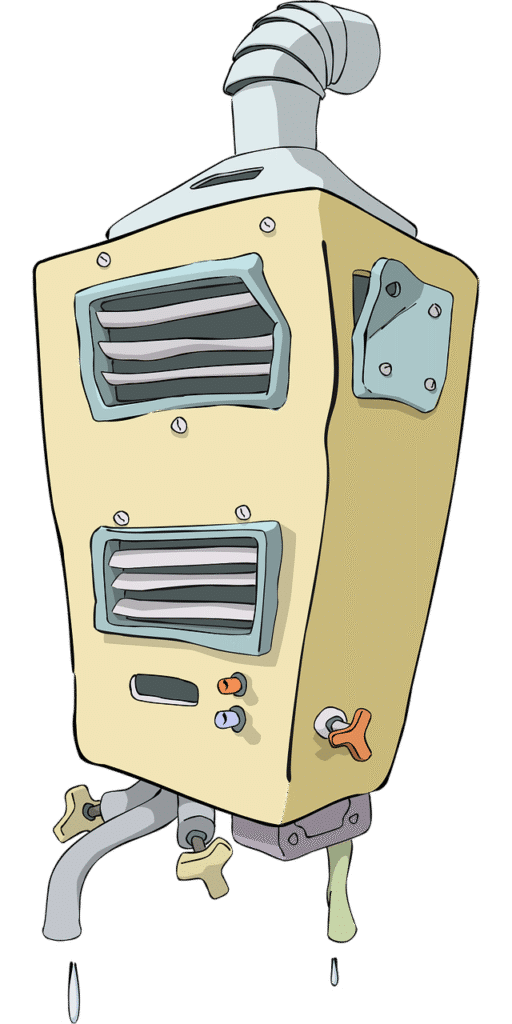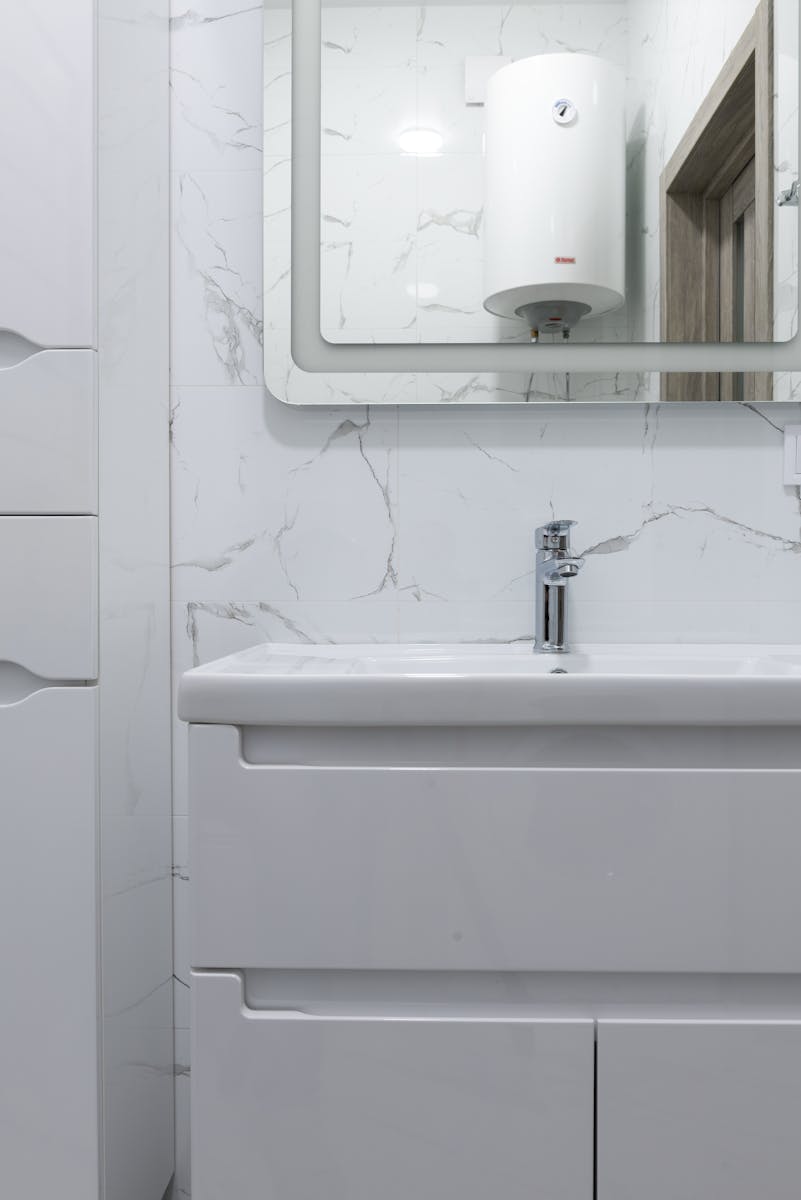Your morning shower turns ice-cold halfway through. Your monthly energy bills keep climbing. That rumbling sound from the basement is getting louder. These are just a few signs that your water heater might be ready for replacement. Whether you’re dealing with an aging tank system or considering an upgrade to a more energy-efficient model, understanding your options can save you thousands of dollars and countless headaches.
Water heater replacement is one of the most significant home improvement investments you’ll make, but it doesn’t have to be overwhelming. This comprehensive guide will walk you through everything you need to know about replacing your water heater, from identifying the right time to make the switch to choosing between different types of systems and understanding the true cost of installation.
Most homeowners face this decision every 8-12 years, depending on their system type and maintenance habits. The good news? Modern water heaters offer better efficiency, longer lifespans, and more hot water than older models. The key is making an informed decision that fits your household’s needs, budget, and long-term goals.

Photo by Alex Tyson on Pexels
Signs Your Water Heater Needs Replacement
Recognizing when your current system is failing can help you avoid emergency situations and plan for a smooth replacement process. Here are the most common indicators that it’s time for a new water heater:
Age and Performance Issues
Traditional tank water heaters typically last 8-12 years, while tankless systems can operate efficiently for 15-20 years. If your unit is approaching or has exceeded its average life expectancy, replacement becomes increasingly cost-effective compared to ongoing repairs.
Water temperature inconsistencies often signal internal component failure. When your hot water runs out faster than usual or takes longer to heat up, your system may be struggling to maintain proper heating cycles. Similarly, if you’re not getting enough hot water for your household’s needs, your current heater may be undersized or losing efficiency.
Physical Signs of Deterioration
Rust-colored water from your hot water taps usually indicates corrosion inside your tank. While replacing the anode rod might temporarily address this issue, extensive internal rusting often means the tank itself is compromised.
Water pooling around your heater’s base suggests tank leaks, which typically worsen over time. Small leaks can quickly become major floods, potentially causing significant water damage to your home. Unusual noises like popping, crackling, or rumbling sounds often indicate sediment buildup that’s causing your system to work harder and less efficiently.
Rising Energy Costs
Older water heaters become less energy efficient over time, leading to higher utility bills. If you’ve noticed your electricity or gas costs increasing without changes to your usage patterns, an aging water heater could be the culprit. Modern energy efficient models can significantly reduce these costs.
Types of Water Heaters: Finding the Right Fit
Choosing the right replacement involves understanding the different types of water heaters available and how they match your home’s specific requirements.
Tank Water Heaters
Traditional storage tank systems remain the most common choice for many households. These units store and continuously heat 30-80 gallons of water, ensuring hot water is always available on demand.
Gas Water Heater Benefits:
Gas units typically heat water faster than electric models and often cost less to operate, especially in areas with low natural gas prices. However, they require proper gas line connections and adequate venting systems.
Electric Water Heaters:
Electric models don’t require venting and can be installed in more locations throughout your home. They’re often easier to install but may have higher operating costs depending on local electricity rates. Electric heaters also provide more consistent heating but take longer to recover after heavy usage.
Tankless Water Heater Systems
Tankless units heat water on-demand, eliminating the need for storage tanks and providing unlimited hot water. These compact systems take up significantly less space and can be mounted on walls, making them ideal for smaller homes or tight installations.
The main advantages include energy savings of 20-30% compared to traditional tanks, since there’s no standby heat loss. Tankless systems also last longer, typically 15-20 years with proper maintenance. However, they require higher upfront investment and may need electrical or gas line upgrades to handle increased power demands.
Heat Pump Water Heater Technology
Heat pump water heaters use electricity to move heat from the surrounding air into the water tank, making them extremely energy efficient. These systems can reduce water heating costs by 60-70% compared to conventional electric water heaters.
Heat pump systems work best in spaces that remain 40-90°F year-round and have at least 1,000 cubic feet of air space around the unit. They also provide the added benefit of dehumidifying the installation area, which can be advantageous in basements or utility rooms.

Photo by Kenny Eliason on Unsplash
Hot Water Heater Replacement Cost Factors
Understanding the complete cost picture helps you budget effectively and make informed decisions about your investment.
Equipment Costs by Type
Basic tank water heaters range from $500-$1,500 for the unit alone, with larger capacity and higher efficiency models commanding premium prices. Tankless water heater systems typically cost $1,000-$3,000 for the unit, depending on fuel source and capacity requirements.
Heat pump water heaters represent the highest upfront investment, usually ranging from $1,200-$3,500 for the equipment. However, their superior energy efficiency often justifies the additional cost through long-term savings.
Installation and Labor Expenses
Professional installation costs vary significantly based on your home’s existing infrastructure and local labor rates. Simple tank-to-tank replacements typically cost $500-$1,500 for labor, assuming no major plumbing modifications are needed.
Tankless installations often require more extensive work, especially when switching from tank systems. You might need gas line upgrades, new electrical circuits, or venting modifications. These installations can add $1,000-$3,000 to your project cost.
Additional Considerations
Permit requirements vary by location but typically add $50-$300 to your project. Many areas require permits for water heater replacements, especially when changing fuel sources or making significant plumbing modifications.
Your home’s existing infrastructure significantly impacts total costs. Older homes may need pipe upgrades, electrical panel modifications, or gas line improvements to accommodate new systems safely and efficiently.

Photo by micheile henderson on Unsplash
Energy Efficiency and Long-Term Savings
Modern water heaters offer substantial improvements in energy efficiency compared to older models, translating into real money savings over their operational lifetime.
Efficiency Ratings and Performance
Look for ENERGY STAR certified models, which meet strict efficiency guidelines and typically use 10-50% less energy than standard models. Gas water heaters should have an Energy Factor (EF) of 0.67 or higher, while electric models should achieve 0.95 or better.
Tankless systems often achieve efficiency ratings of 0.8-0.95, significantly higher than traditional tanks. Heat pump water heaters can achieve efficiency ratings above 2.0, meaning they produce more than twice the heat energy they consume in electricity.
Calculating Your Potential Savings
A typical household spends $400-$600 annually on water heating. Upgrading to a high-efficiency model can reduce these costs by 20-70%, depending on your current system and chosen replacement.
For example, switching from an older electric tank to a heat pump water heater could save $300-$400 per year. Over the system’s 10-15 year lifespan, these savings often exceed the additional upfront investment.
Environmental Impact
Energy efficient water heaters also reduce your home’s environmental footprint. ENERGY STAR certified models prevent thousands of pounds of carbon dioxide emissions over their lifetime compared to standard units.
Professional Installation vs. DIY Considerations
While some homeowners consider self-installation to save money, water heater replacement involves complex plumbing, electrical, and gas connections that require specialized knowledge and tools.
When to Call G.A. Eberly Plumbing & Heating
Gas water heater installations always require professional expertise due to safety concerns with gas line connections and venting requirements. Improper installation can create carbon monoxide hazards or gas leaks that endanger your family.
Electric installations also benefit from professional service, especially when upgrading to higher-capacity units that need new electrical circuits. Licensed plumbers ensure all connections meet local codes and safety standards.
Tankless and heat pump systems typically require professional installation due to their complex requirements for proper sizing, venting, and integration with existing plumbing systems.
Benefits of Professional Water Heater Installation
Experienced plumbing companies provide warranties on their work and ensure installations meet all local building codes. They can also identify potential issues with your home’s infrastructure before they become costly problems.
Professional installers have the proper tools and knowledge to complete installations safely and efficiently. They can also dispose of your old unit properly and help you understand your new system’s operation and maintenance requirements.
Maintenance Tips for Maximum Lifespan
Proper maintenance significantly extends your water heater’s life and maintains its efficiency throughout its operational period.
Regular Maintenance Tasks
Annual maintenance should include flushing the tank to remove sediment buildup, testing the temperature and pressure relief valve, and inspecting the anode rod in tank systems. These simple tasks can add years to your system’s life.
Tankless systems require annual descaling in areas with hard water, while heat pump units need regular air filter cleaning and coil maintenance. Following manufacturer maintenance schedules prevents premature failures and maintains warranty coverage.
Professional Service Recommendations
Schedule professional inspections every 2-3 years to catch potential issues early. Experienced technicians can identify problems like failing heating elements, corroded components, or efficiency losses before they require emergency repairs.
Regular professional maintenance often costs less than emergency repair calls and helps ensure your system operates at peak efficiency throughout its lifespan.
Helpful Resources and Links
Here are a few valuable resources to help you better understand water heater maintenance and repair
Home Depot – Water Heater Buying Guide
Discover the differences between water heater types to make an informed buying decision.
Angi – How to Fix a Leaking Water Heater
Step-by-step guidance on how to address common water heater leaks.
This Old House – Water Heater Troubleshooting
Learn how to identify and resolve common water heater issues with expert advice.
Consumer Reports – Water Heater Ratings and Reviews
Compare water heater models and find the best option for your home.
Energy.gov – Water Heater Maintenance Tips
Learn practical tips and advice for maintaining your water heater to improve its efficiency and lifespan.
Feel free to visit these links for additional insights to keep your water heater running smoothly or to decide when it’s time for professional help!

Photo by OpenClipart-Vectors on Pixabay
Making Your Final Decision
Choosing the right water heater replacement involves balancing upfront costs, long-term savings, and your household’s specific hot water needs. Consider factors like available space, fuel source preferences, and local utility costs when making your decision.
Start by calculating your household’s hot water usage patterns. Larger families or homes with multiple bathrooms typically benefit from higher-capacity systems or tankless units that provide unlimited hot water. Smaller households might find that compact, efficient tank systems meet their needs at lower cost.
Don’t forget to research available rebates and incentives. Many utility companies offer rebates for energy efficient water heaters, and federal tax credits may apply to qualifying heat pump and solar systems. These incentives can significantly offset higher upfront costs.
Ready to replace your water heater? Contact G.A. Eberly Plumbing & Heating for expert guidance and professional installation. With over 115 years of experience serving the DMV area, our licensed plumbers will help you choose the perfect system for your home and ensure it’s installed correctly for years of reliable service.

